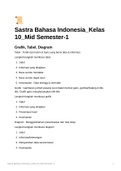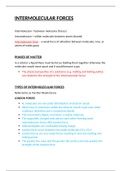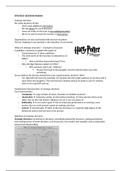Complete Summary HRM & Leadership in International Organizations
Lecture 1 - Introduction to International Organizations
Literature:
- Krans, M.P, Mingst, K.A., Stiles, K.W. (2015) The Challenges of Global Governance,
in International organizations: the political and processes of global governance.
Lynne Rienner Publishers, pp. 1-41.
- Tallberg, J., Zürn, M. (2019). The legitimacy and legitimation of international
organizations: introduction and framework. The Review of International
Organizations, 14:581–596
Introduction to IGOs: Aims & Purpose
Global governance
- Governance and government are connected concepts, but they are not the same.
Both terms refer to purposive behavior and goal-oriented acting. However, the drivers
of governance and government differ:
- Government: actions are backed by formal authorities such as police
- Governance: actions are backed by shared goals that can be formal as well
as informal and do not per se derive from legal responsibilities
- In global governance there is no hierarchical structure of power or authority
- In government, primarily (bodies of) the state have a function, whereas in
governance there are also non-state actors involved
- Governance has emerged strongly due to circumstances such as:
- Globalization: the increased interdependencies result in complexities
- Technological changes: technological advances result in for example an
increase in human and capital movement and communication. In order to
facilitate this, governance is needed
- End of the Cold War: the shift from one historical era to another resulted in a
more networked system and more threats and opportunities for networks and
governance
- Expanding transnationalism: the connection between individuals and/or
non-state organizations that communicate over borders has increased. This
results in structural changes (e.g.: attention for human rights, climate) which
need governance
- Multilateralism: coordinating relations among multiple states in accordance with
certain principles. Relationships defined by agreed-upon rules and principles.
Actors in global governance
- States
- NGOs (e.g.: Greenpeace)
- Experts and epistemic communities (e.g.: Intergovernmental Panel on Climate
Change)
- Networks and partnerships (e.g.: Active Learning Network for Accountability and
Performance)
- Multinational corporations (e.g.: Google)
- Private foundations (e.g.: Bill & Melinda Gates)
- IGO and their bureaucracies (e.g.: NATO, EU, WHO)
,Global governance & IGOs
- Global governance: “The collective effort by sovereign states, international
organizations, and other non-state actors to address common challenges and seize
opportunities that transcend national frontiers… It is and ungainly patchwork of
formal and informal institutions” (Patrick, 2014:59)
- “IGOs are organizations that include at least three states as members, that have
activities in several states, and that are created through a formal intergovernmental
agreement such as a treaty, charter or statute. They also have headquarters,
executive heads, bureaucracies and budgets” (Krans et al, 2015)
Why do we need IGOs?
- Order & stability
- Reduce transaction costs
- Efficiently solve transboundary problems
- When major trans-border upheavals and security or economic crises occur, IOs are
looked towards for guidance
Classifying IGOs
- Geographic scope:
- Global (UN, WHO)
- Regional (EU, ASEAN)
- Subregional (ECOWAS, GCC)
- Purpose:
- General (UN, OAS)
- Specialized (WTO, WHO)
What do IGOs do?
- Disseminate information
- Define norms and standards of behavior
- Create and supervise rules
- Act as a forum for discussions
- The proliferation of international forums means that states and nonstate
actors can often choose where to take certain issues—an option called
“forum shopping”. In general, states and nonstate actors will select forums
where they believe they will get the best reception.
- Provide resources and technical assistance
IGOs tensions
- Sovereignty vs multilateralism
- Collective decision-making
- Resources and expertise
- Representation
- Implementation
Nongovernmental Organizations (NGOs)
- Service groups and advocacy groups
- IGOs often make room for NGOs in their organizations
, IGO’s Political Legitimacy
Why is political legitimacy important for IGOs?
- Because it affects IGO’s ability to:
- Remain as focal arenas for state’s cooperation
- Develop new rules and norms
- Secure compliance with international rules and norms
- Solve (global) democratic deficit
Political legitimacy defined
- “Political legitimacy is a belief within a given constituency or other relevant
audience that a political institution’s exercise of authority is appropriate” (Tallberg and
Zürn, 2019)
- Authority is the right to make (binding) decisions and interpretations within a
particular area/region in the name of collective interest
- Accountability: reporting, measuring, justifying and explaining actions
IGO’s audiences: constituencies and observers
- Constituencies are directly affected by IGOs, whereas observers can be affected
- States
- Governmental organizations
- Civil society organizations
- Citizens
Legitimacy beliefs
Lecture 1 - Introduction to International Organizations
Literature:
- Krans, M.P, Mingst, K.A., Stiles, K.W. (2015) The Challenges of Global Governance,
in International organizations: the political and processes of global governance.
Lynne Rienner Publishers, pp. 1-41.
- Tallberg, J., Zürn, M. (2019). The legitimacy and legitimation of international
organizations: introduction and framework. The Review of International
Organizations, 14:581–596
Introduction to IGOs: Aims & Purpose
Global governance
- Governance and government are connected concepts, but they are not the same.
Both terms refer to purposive behavior and goal-oriented acting. However, the drivers
of governance and government differ:
- Government: actions are backed by formal authorities such as police
- Governance: actions are backed by shared goals that can be formal as well
as informal and do not per se derive from legal responsibilities
- In global governance there is no hierarchical structure of power or authority
- In government, primarily (bodies of) the state have a function, whereas in
governance there are also non-state actors involved
- Governance has emerged strongly due to circumstances such as:
- Globalization: the increased interdependencies result in complexities
- Technological changes: technological advances result in for example an
increase in human and capital movement and communication. In order to
facilitate this, governance is needed
- End of the Cold War: the shift from one historical era to another resulted in a
more networked system and more threats and opportunities for networks and
governance
- Expanding transnationalism: the connection between individuals and/or
non-state organizations that communicate over borders has increased. This
results in structural changes (e.g.: attention for human rights, climate) which
need governance
- Multilateralism: coordinating relations among multiple states in accordance with
certain principles. Relationships defined by agreed-upon rules and principles.
Actors in global governance
- States
- NGOs (e.g.: Greenpeace)
- Experts and epistemic communities (e.g.: Intergovernmental Panel on Climate
Change)
- Networks and partnerships (e.g.: Active Learning Network for Accountability and
Performance)
- Multinational corporations (e.g.: Google)
- Private foundations (e.g.: Bill & Melinda Gates)
- IGO and their bureaucracies (e.g.: NATO, EU, WHO)
,Global governance & IGOs
- Global governance: “The collective effort by sovereign states, international
organizations, and other non-state actors to address common challenges and seize
opportunities that transcend national frontiers… It is and ungainly patchwork of
formal and informal institutions” (Patrick, 2014:59)
- “IGOs are organizations that include at least three states as members, that have
activities in several states, and that are created through a formal intergovernmental
agreement such as a treaty, charter or statute. They also have headquarters,
executive heads, bureaucracies and budgets” (Krans et al, 2015)
Why do we need IGOs?
- Order & stability
- Reduce transaction costs
- Efficiently solve transboundary problems
- When major trans-border upheavals and security or economic crises occur, IOs are
looked towards for guidance
Classifying IGOs
- Geographic scope:
- Global (UN, WHO)
- Regional (EU, ASEAN)
- Subregional (ECOWAS, GCC)
- Purpose:
- General (UN, OAS)
- Specialized (WTO, WHO)
What do IGOs do?
- Disseminate information
- Define norms and standards of behavior
- Create and supervise rules
- Act as a forum for discussions
- The proliferation of international forums means that states and nonstate
actors can often choose where to take certain issues—an option called
“forum shopping”. In general, states and nonstate actors will select forums
where they believe they will get the best reception.
- Provide resources and technical assistance
IGOs tensions
- Sovereignty vs multilateralism
- Collective decision-making
- Resources and expertise
- Representation
- Implementation
Nongovernmental Organizations (NGOs)
- Service groups and advocacy groups
- IGOs often make room for NGOs in their organizations
, IGO’s Political Legitimacy
Why is political legitimacy important for IGOs?
- Because it affects IGO’s ability to:
- Remain as focal arenas for state’s cooperation
- Develop new rules and norms
- Secure compliance with international rules and norms
- Solve (global) democratic deficit
Political legitimacy defined
- “Political legitimacy is a belief within a given constituency or other relevant
audience that a political institution’s exercise of authority is appropriate” (Tallberg and
Zürn, 2019)
- Authority is the right to make (binding) decisions and interpretations within a
particular area/region in the name of collective interest
- Accountability: reporting, measuring, justifying and explaining actions
IGO’s audiences: constituencies and observers
- Constituencies are directly affected by IGOs, whereas observers can be affected
- States
- Governmental organizations
- Civil society organizations
- Citizens
Legitimacy beliefs








